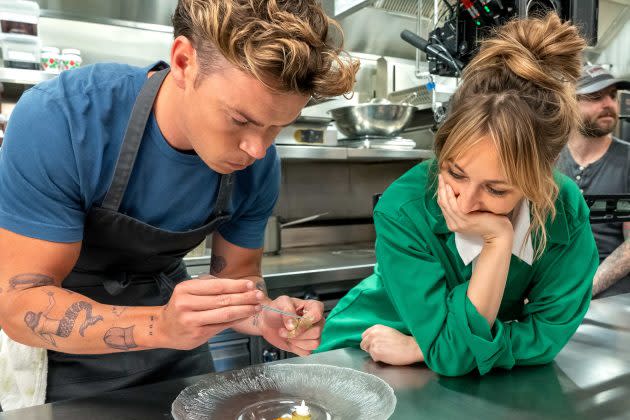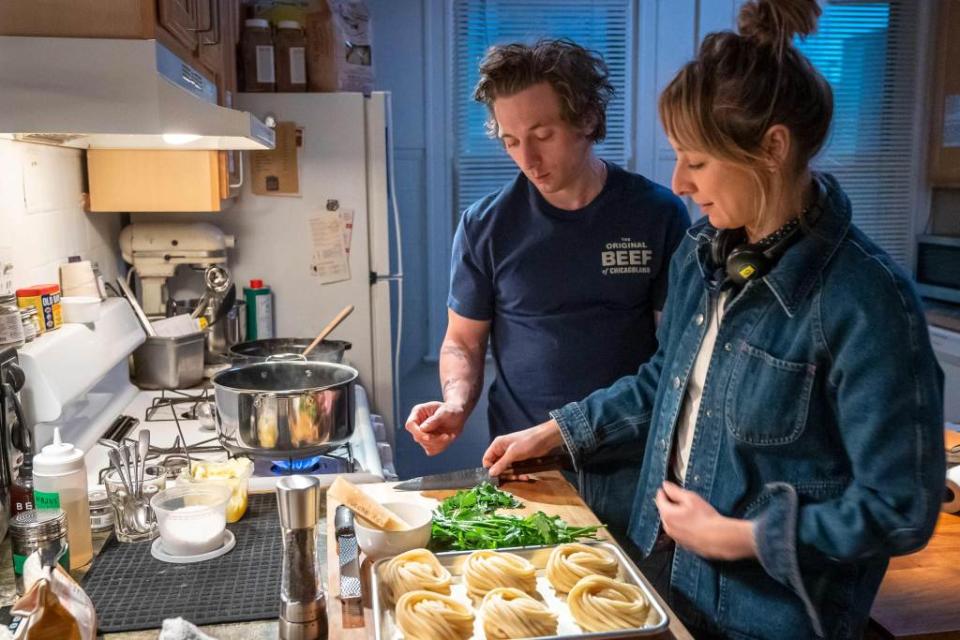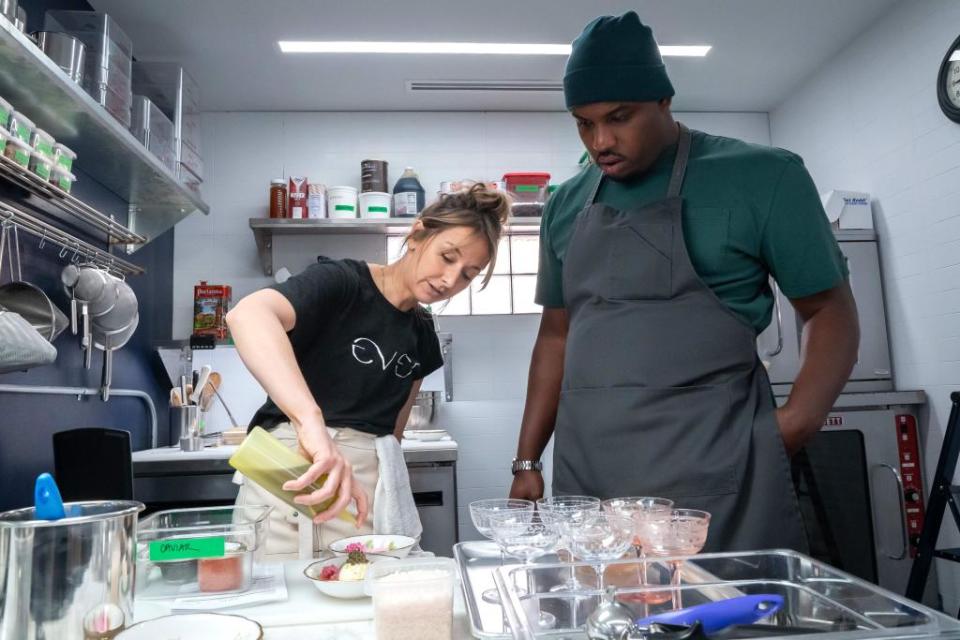‘The Bear’ Culinary Producer Courtney Storer on How Her Restaurant Burnout Impacts the Story: ‘It Feels Like Art Therapy’

“The Bear” became an overnight sensation when its first season debuted in 2022 because of its visceral honesty about how it looks and feels to work in a restaurant. Much of the credit for that belongs to Courtney Storer.
Storer, sister of series creator Chris Storer, has worked in high-profile kitchens from Verjus in Paris to Jon & Vinny’s in L.A., but her most recent job has been to serve as “The Bear’s” culinary producer, getting the writers, cast and crew acclimated to the world the series takes place in.
More from Variety
“In Season 1, it was it was a lot of storytelling with the writers, but also providing my journals and different training guides to give insight into the ethos of restaurants,” Storer says. “It’s bigger than the conflicts: It’s the decision-making, the structure, the procedures, the recipes.”
Her role extends beyond just the technicalities of teaching writers the steps to opening a restaurant and actors how to carry their bodies through a kitchen. Many of those show’s most emotional pieces — Carmy’s (Jeremy Allen White) difficulty processing his family’s past, Sydney’s (Ayo Edebiri) struggle to feel taken seriously at work — stem directly from Storer’s personal history.
The triumphs are informed by Storer’s achievements and relationships, too. By the end of Season 2, Carmy and Sydney have designed a tasting menu that’s both personal and (hopefully) Michelin star-worthy. Mirroring that behind the scenes, Storer designed that menu in collaboration with Tim Flores and Genie Kwon of Chicago’s Kasama: “Tim and I worked together at GT Fish & Oyster when we were babies. I was a server, he was a food runner and we were just buds,” Storer recalls. “I moved to California, he stayed in Chicago, and we were just pen pals. He’d be like, “Oh my God, you’re at Jon & Vinny’s!” And I’m like, ‘Oh my God, you’re working at Oriel! So it was a no brainer when I came back to Chicago that I wanted him to help me out. It meant a lot for us to cook together because we had never done that before.”
Variety spoke with Storer about how her work on “The Bear” feels like “art therapy” (and which cast members are the snackiest).
Since you’d already taught the writers and actors so much about the food world with Season 1, what were your priorities upon joining Season 2?
For Season 2, the writers room felt different, like, “Let’s dig deeper into who these people are.” Why are we able to, in hospitality, get people to come back to work? It’s so stressful, so anxious, but what about the joy? What about the love, the family, the wonderful things that allow people to stay in these places?
We also knew we were building a new restaurant and conceptualizing a menu. So the writers room is one thing, and then I go on my own journey with vision boards. Knowing that there’s a Seven Fishes episode, how can we show family trauma and pain? And get you to a beautiful place even though it’s complicated? Also, what makes a chef a chef? I’ve been drawn to restaurants because I’m a people person. I like to put arrows out a lot, and not arrows in. Creating that balance is a lot of what we explored in Season 2.
And I try to involve the actors as much as I can. “You’re making an omelet. What would you put into it if you were making this at home for someone you loved?” I take their feedback and we put it on camera. l create it to suit them, because they perform differently when that’s the case.
What do you mean when you talk about putting arrows out instead of in?
In the chef world, it can be like the Broken Hearts Club sometimes. The chefs I’ve come up with, we’re really good caretakers for other people, but when it comes to caretaking for ourselves, there’s a block there. And going through a lot of trauma as a child, what made me feel better was cooking for others and smelling food — tangible, tactile things that gave me a new world. I was out of my head and into my hands. Over the years as a chef, I was trying to make my reputation more well-known. I was trying to work for the best chefs. Then I was like, “Do I open a restaurant? Do I develop a product?” But getting out there was taking me out of my interpersonal world, and I had to slow down. I burnt out in restaurants, and I had to take a step back and better understand what was going on and why I was having bad anxiety attacks. That wasn’t just because of restaurants; it was because of a lot of other issues. But I had to slow down to really see it.

That’s also a good description of Carmy — the food world is killing him, but so is his personal life. Would you say that a lot of your personal stories are making it to the screen?
Yes, definitely. Those are the conversations I have with the writers. And with Joanna Calo and Chris, and being able to say, “Guys, this doesn’t feel right. This doesn’t really happen,” even if it’s a script issue. And I have the the most amazing team. They’re like, “Okay, can you explain what would happen?” It’s bigger than me just being the culinary mind and saying, “You guys go and do it.” I’m elbow-to-elbow with these actors, cooking with them, stepping out of the scenes that you’re seeing, and then I come back in when they say “Cut.” I have a very close relationship with everybody, the crew included.
Can you walk me through some examples of scenes you’ve helped correct to make more authentic to your kitchen experiences?
We [in restaurants] literally speak a different language, and each kitchen is different. Some people like hearing “Chef”; some people don’t. Some people say “Heard”; some people don’t. It depends on the culture of the kitchen, and we had to create that culture. And I like the actors to do the work. I want them to call back to the chef, grab pots like they were setting up for bucatini. Sometimes Chris would be like, “They can just mimic it this time.” I’m like, “No. They need to put the steak in the oven, because that will make a difference in how they look when they’re holding it because of the weight in their hand, and how your muscles react to carrying those things.” It’s more work for me, but it makes a better product.
Season 1 was all about how toxic and chaotic the kitchen of the Beef was, and in Season 2 is the characters work on opening the Bear. How did you approach building the culture of the new restaurant? It’s certainly a healthier workplace, but there are moments when people fall back into their ways.
I came from human resources, and then I became a chef. So I came into operations without structure, walked into chaos every day, and then had to find ways to implement a culture and systemize ways to work with each other. I’m a big problem solver, and it made me a good leader as a chef. But the Bear is one restaurant among many. The Bear isn’t the answer or the solution. We’re not saying we do everything perfect. This is a snapshot of what this restaurant experience is, but it’s not to say that other people haven’t done it better, faster, more efficient, more kind.
We wanted to show that Carmy’s lashing out is a problem. Richie talking inappropriately is a problem. These things are being looked at, and you see Sydney come in like, “Whoa, I’m not trying to do that.” You can see that she operates differently. She has a very honest connection with the chefs; she talks to them like they’re equals. She gets the work done, but in a different approach. What we’re trying to do at the Bear is address some of the things that are problematic and see how they deal with those issues. Natalie looking at the numbers and legitimizing the business is a foundational thing that they didn’t have. If you fix these foundational problems, do the stressors calm down? Can we turn the dysfunction into function?
It definitely stands out that the women — Sydney, Natalie, Tina — are essential to turning the restaurant culture around this season.
Yes. I lived with Chris for years coming up as a chef, and he would see me having a hard time just going to work the next day. I worked in a male-dominated field and often felt unable to use my voice or overruled. It took time to understand how to bring me to the table and not feel like I had to become them to get my point across. It takes a village. It’s not just about the head chef, ever. The head chef can succeed because of a core of amazing people underneath. Showcasing those individuals is really important, the team that supports your vision.
There must be something cathartic about exploring your history as a chef in this fictional way.
I’ve been saying a lot that it feels like art therapy. It’s also a big responsibility. I don’t take it lightly that I come from a community of chefs and hospitality professionals, and I want to do right by them. Not everybody’s going to be into what we showed on “The Bear,” and not everyone’s gonna say this is a genius thing — we don’t think we’re geniuses either. But what I will say is that I brought my heart. I brought my experience. I tried to bring my honesty to what we made. You know, everybody knows a Richie character. Sydney and Richie getting the other side is also something I’ve experienced in restaurants. I’ve had conflict with front-of-house, or a manager who tells me how to do my job and doesn’t understand what it’s like to be a chef. There’s tension, and if you stay with it and communicate, you can get to the other side of that and grow.

What do you want people to know about the food we see on screen in “The Bear”?
Everything on “The Bear” is real. All the food that you see is edible and delicious. We do it on purpose, because our cast and crew, they’re nibblers. I can’t make something not great, because I’ll be mad about it. Let me tell you, Jon Bernthal [who plays Mikey], if he’s around food, he eats it. Season 1, there were Italian sausages and he ate all of them. Then this season, I see him in the kitchen with Jamie [Lee Curtis, who plays Carmy, Mikey and Natalie’s mother] and they’re just eating the meatballs. I’m like, “Thank God I made them so good.”
Lionel [Boyce, who plays Marcus] and I also worked really closely before the show. He trained here in my kitchen. The honeybun [on the Bear’s dessert menu] was Lionel’s idea. The savory cannoli was Chris’ idea that we brought to life. For the donut, we made zepolle dough, which is my favorite and an Italian tradition.
I’m also always thinking about Chicagoland produce and accessibility to ingredients. That’s another part of the story. What seems realistic, versus a California menu? What can we actually get here that’s special?
This interview has been edited and condensed.
Best of Variety
Sign up for Variety’s Newsletter. For the latest news, follow us on Facebook, Twitter, and Instagram.

 Yahoo News
Yahoo News 
